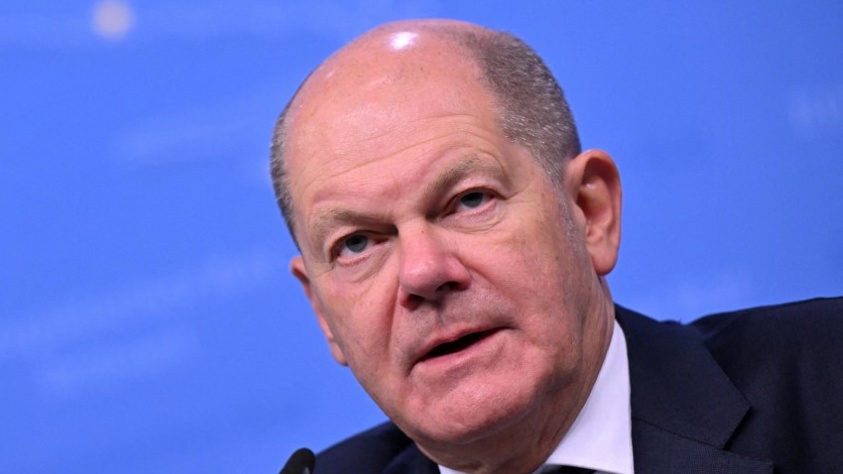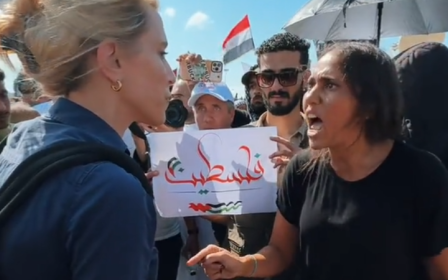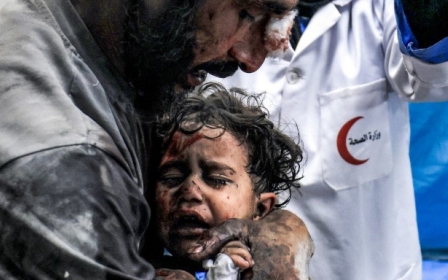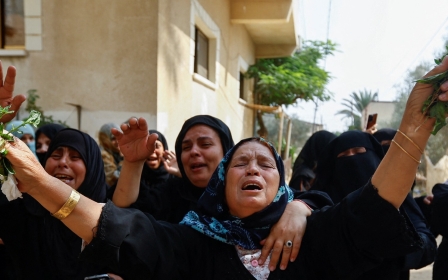Israel-Palestine war: Germany's march to illiberalism in the name of defending Israel

Germany’s stance towards the war in Gaza is clear: “In such difficult times, there is only one place we can be: at Israel’s side,” Chancellor Olaf Scholz said during a recent visit to the country.
But rather than situating this support in the context of the current conflict, Scholz has pointed to the historical legacy of Germany’s Nazi regime, which killed six million Jews. In a special address to the nation, he declared: “Our own history, our responsibility deriving from the Holocaust, makes it our permanent duty to stand up for the existence and security of the state of Israel. This responsibility guides us.”
Going further, he framed German demonstrations against the Israeli army’s assault on Gaza as a celebration of acts of terrorism that gave “free rein to [protesters’] hatred of Israel and of our Jewish fellow citizens”, thus conflating antisemitism with a critique of the Israeli government.
But does remembering the past conceal the ability to see the present? While the German vice-chancellor vowed that "Jews must be able to live freely and safely", the recent rise of anti-Muslim racism is ignored.
Just days after the war broke out, while hundreds of thousands of people were pouring into the streets worldwide, Germany banned demonstrations that raised awareness of the suffering of Palestinians. While the killing of innocent Israelis was understandably mourned, the killing of innocent Palestinians was simply dismissed.
On 7 October, the day of the Palestinian fighters' attack, Scholz expressed “solidarity with Israel” on the social media site X, along with an image of Brandenburg Gate illuminated in the colours of the Israeli flag.
But to this day, weeks after Israel launched a campaign of massive bombardment against tens of thousands of civilian Palestinians, no similar statements of empathy have been made with regards to Palestinian who have been killed.
This one-sided position, common among western governments, was captured well in the words of Jordan’s King Abdullah, who said: “The message the Arab world is hearing is that Palestinian lives matter less than Israeli ones.” This becomes truer every day amid an unfolding genocide in Gaza.
Human rights trampled
Only unauthorised acts of protest in Germany, such as the projection of the words “Stop genocide in Gaza immediately” onto the Bundestag in Berlin, can counteract this one-sidedness. And things are not going well for those trying to do so, with Amnesty International’s Germany branch recently noting: “The blanket bans on pro-Palestinian demonstrations are questionable from a human rights perspective. Freedom of assembly applies to everyone who wants to demonstrate now.”
Such advocacy for human rights is apparently not being well received in the corridors of power, where politicians and mainstream media remain intent on conflating pro-Palestinian activism with support for terrorism.
Follow Middle East Eye's live coverage for the latest on the Israel-Palestine war
One pro-Palestinian demonstrator in North Rhine Westphalia who was attacked by a pro-Israeli demonstrator was subsequently questioned by police on why he was holding a flag of Palestine. They also asked in an official questionnaire: “What is your political position? Do you have a problem with people of Israeli origin?”
This resonates with the state’s overall discourse, in which slogans such as “Free Palestine” are regarded as “not a harmless chant, but the battle cry of an internationally active terrorist gang”, as per the Christian Democratic Union (CDU).
The criminalisation of pro-Palestinian activism has extended to a ban on Samidoun, a group that advocates for Palestinian prisoners and reportedly has links with the Popular Front for the Liberation of Palestine, which is designated as a terrorist organisation in some countries.
Is Germany on the road to illiberal democracy in the name of defending democracy?
The McCarthyite climate of censorship, suppression and intimidation has affected people in many different segments of German society. A state official was forced to leave office early over a social media post critical of Israel, while an employee at the Jewish Museum Berlin was fired for speaking about apartheid in the occupied West Bank.
Germany’s "anti-terror” drive seems to be backed by growing hysteria, like Scholz recently telling Der Spiegel: “We finally have to deport people on a large scale” about refugees in the country. Others have made similar comments, including CDU head Friedrich Merz, who said: “Germany cannot take in any more refugees. We have enough antisemitic young men in the country.”
The response to current debates, it seems, is a tougher asylum policy. “We have to take away their spaces, close down their mosques, their cafes and clubs, and confiscate the money that would otherwise be used for terror in the world,” said Karin Prien, the CDU’s vice chairwoman.
In Berlin, schools can now ban the keffiyeh and the Palestinian flag, thus attempting to control society, while the Israeli flag remains ubiquitous in representative institutions.
Germany seems to be governing through fear. These are threatening developments - not only due to the restrictions on free speech and assembly, but also because of the expansion of social control and surveillance. Is Germany on the road to illiberal democracy in the name of defending democracy?
The views expressed in this article belong to the author and do not necessarily reflect the editorial policy of Middle East Eye.
Middle East Eye propose une couverture et une analyse indépendantes et incomparables du Moyen-Orient, de l’Afrique du Nord et d’autres régions du monde. Pour en savoir plus sur la reprise de ce contenu et les frais qui s’appliquent, veuillez remplir ce formulaire [en anglais]. Pour en savoir plus sur MEE, cliquez ici [en anglais].





